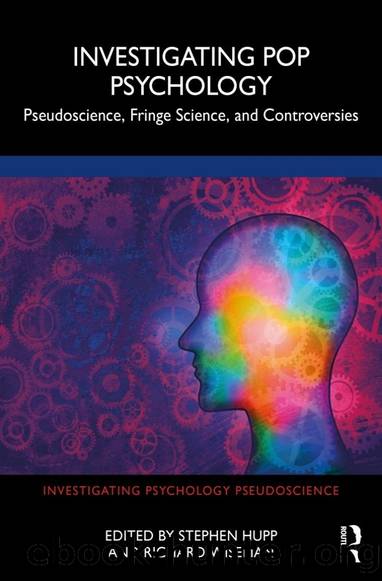Investigating Pop Psychology: Pseudoscience, Fringe Science, and Controversies by Stephen Hupp

Author:Stephen Hupp [Hupp, Stephen]
Language: eng
Format: epub
ISBN: 9780367609948
Amazon: 0367609940
Barnesnoble: 0367609940
Publisher: Routledge
Published: 2023-04-15T05:00:00+00:00
Psychosexual Stages and Development 79
of the population. Evidence for this exists in the research examining beliefs about myths
in psychology. Studies conducted with college students, parents, pre-professionals, and
the public have found certain myths rooted in Freudâs theory of psychosexual development are held by many as true. For example, several empirical investigations have found that people tend to believe the notion that bedwetting is a sign of a childâs underlying emotional problems â a decidedly Freudian concept. Fruit et al. (2019) reported that one-third of pre-professional nurses and speech-language pathologists surveyed endorsed the myth that children who frequently wet the bed typically have underlying
emotional issues. Hupp et al. (2017) found that almost half of college students and parents surveyed believed the same mythical statement.
Surprisingly, Freudâs theory of psychosexual development can be found on many
national professional licensure exams. Published study materials for the Examination of
Professional Practice in Psychology (EPPP) and the National Counselor Exam (NCE)
include information specific to the psychosexual stages of development (Association for
Advanced Training in the Behavioral Sciences, 2020; National Counseling Exam, n.d.).
While it might be a stretch to suggest this indicates widespread belief in Freudâs theory
among these professionals, test developers in these professional fields appear to view Freudâs theory as relevant to practice. The presence of psychosexual development on these examinations also suggests some professional training programs at least reference Freud in their curricula.
The Evidence
Freudâs theory of psychosexual development remains popular. Within a research context,
the perspective influenced the field of psychology by calling attention to the importance
of early childhood experiences, the role of the unconscious mind in shaping behavior, and
the need to understand developmental trends over time (Papalia et al., 2008). These contributions inspired research across numerous topics such as personality and attachment.
Despite Freudâs influence on public and scientific thinking, however, the psychosexual
developmental theory itself lacks strong evidence. For example, critical components of stages such as the Oedipal complex are now considered to be obsolete (Papalia et al., 2008).
Related phenomena, such as repression, are also inherently difficult â if not impossible â to study in relation to the experiences that Freud described (Papalia et al., 2008). Yet, the ability to test the tenets of a theory and to falsify claims is necessary criteria for strong and effective theories (Morling, 2021).
Overall, Freud represented his theory of psychosexual development as scientific, al-
though he has been criticized for presenting fictional case studies to support his claims, misinterpreting data, rejecting or ignoring alternative explanation and theories, and failing to offer his ideas to rigorous experimental testing (Goodwin, 2015; Greenwood,
2015). However, researchers and applied psychodynamic practitioners have attempted to use scientific methods to support Freudâs psychosexual developmental theory and, more
specifically, the relationship between psychosexual development and personality. This section briefly reviews that literature and provides evidence against Freudâs theory in favor of alternative perspectives.
One potential reason why the psychosexual developmental theory endures despite its
limitations may be that researchers continue to observe aspects of Freudâs legacy in other areas of psychology (Westen, 1998). For example, the unconscious mind was central to Freudâs theory, and psychotherapy aimed to uncover these unconscious thoughts.
Download
This site does not store any files on its server. We only index and link to content provided by other sites. Please contact the content providers to delete copyright contents if any and email us, we'll remove relevant links or contents immediately.
Animal Frequency by Melissa Alvarez(4463)
Sigil Witchery by Laura Tempest Zakroff(4238)
Real Magic by Dean Radin PhD(4121)
Fingerprints of the Gods by Graham Hancock(3996)
Aleister Crowley: The Biography by Tobias Churton(3634)
Journeys Out of the Body by Robert Monroe(3619)
Alchemy and Alchemists by C. J. S. Thompson(3516)
The Rosicrucians by Christopher McIntosh(3513)
Mysteries by Colin Wilson(3448)
Hitler's Monsters by Eric Kurlander(3329)
The Hatha Yoga Pradipika (Translated) by Svatmarama(3329)
Wicca: a guide for the solitary practitioner by Scott Cunningham(3167)
John Dee and the Empire of Angels by Jason Louv(3163)
Infinite Energy Technologies by Finley Eversole(2975)
Book of Life by Deborah Harkness(2933)
Dark Star Rising by Gary Lachman(2865)
The Book of Lies by Aleister Crowley(2842)
Aliens by Jim Al-Khalili(2827)
To Light a Sacred Flame by Silver RavenWolf(2814)
